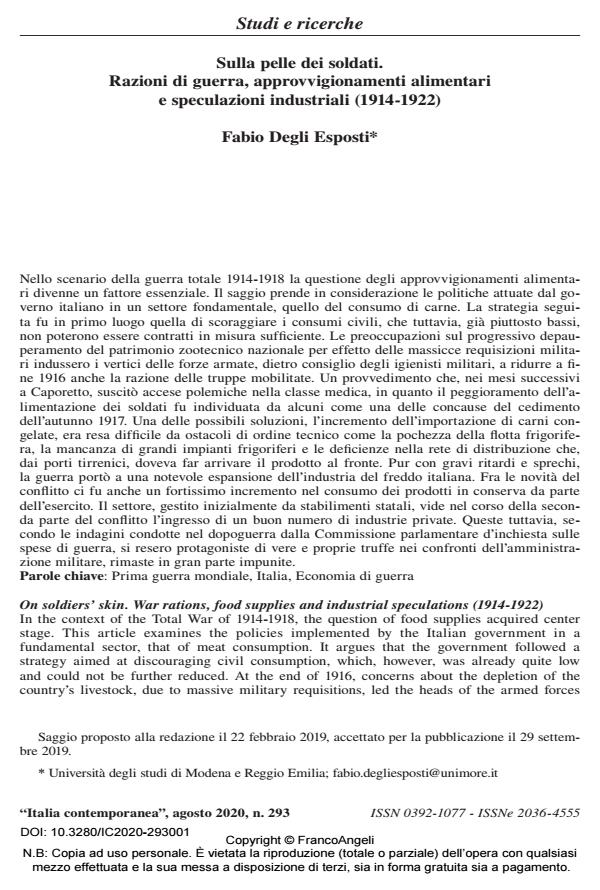On soldiers’ skin. War rations, food supplies and industrial speculations (1914-1922)
Journal title ITALIA CONTEMPORANEA
Author/s Fabio Degli Esposti
Publishing Year 2020 Issue 2020/293
Language Italian Pages 38 P. 9-46 File size 327 KB
DOI 10.3280/IC2020-293001
DOI is like a bar code for intellectual property: to have more infomation
click here
Below, you can see the article first page
If you want to buy this article in PDF format, you can do it, following the instructions to buy download credits

FrancoAngeli is member of Publishers International Linking Association, Inc (PILA), a not-for-profit association which run the CrossRef service enabling links to and from online scholarly content.
In the context of the Total War of 1914-1918, the question of food supplies acquired center stage. This article examines the policies implemented by the Italian government in a fundamental sector, that of meat consumption. It argues that the government followed a strategy aimed at discouraging civil consumption, which, however, was already quite low and could not be further reduced. At the end of 1916, concerns about the depletion of the country’s livestock, due to massive military requisitions, led the heads of the armed forces - following the advice of military hygienists -, to reduce mobilized troops’ rations. In the months following Caporetto, this decision became controversial among doctors, who interpreted the worsening of soldiers’ nutrition as one of the causes of the defeat of autumn 1917. The increase in the import of frozen meat, which would have partly solved the problem, was impossible due to technical issues, such as the scarce number of refrigeration ships, the lack of large refrigeration systems and deficiencies in the distribution network, which had to transport products from the ports on the Tyrrhenian sea to the front. Despite serious delays and waste, the war led to a notable expansion of the Italian freezing industry. The conflict also brought to an increase in the consumption of canned goods. During the second part of the war, this sector, which was initially managed by public industries, became characterized by a growing number of private firms. However, according to the Commissione parlamentare d’inchiesta sulle spese di guerra, these carried out a series of frauds against the military administration, which went largely unpunished.
Keywords: First Word War, Italy, War economy
Fabio Degli Esposti, Sulla pelle dei soldati. Razioni di guerra, approvvigionamenti alimentari e speculazioni industriali (1914-1922) in "ITALIA CONTEMPORANEA" 293/2020, pp 9-46, DOI: 10.3280/IC2020-293001